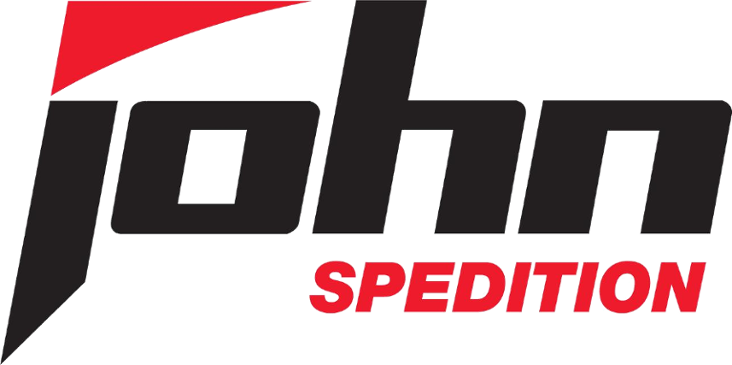The start of a success story: The beginnings of John Spedition.
In 1945, Horst John began organizing supply transports for the Americans from Fulda to Berlin and Frankfurt. Soon after, he established branches in Frankfurt and Berlin, followed by Wuppertal and Hahn. In 1962, the transportation business in Fulda was expanded and developed into a freight forwarding company. In the early 1990s, two additional freight forwarders were acquired. Since the establishment of CargoLine Logistics Network GmbH, John Spedition has been active in all areas of logistics. The company currently employs over 200 employees and generates an annual revenue of approximately 25 million euros.
From Empty Shelves to Full Order Books
Full Speed Ahead into the Future: Europe Gathers in Eichenzell
On the highway, trucks can be annoying, especially when they engage in “elephant races.” However, we rarely consider that out of the 4.637 billion tons of goods transported in Germany in 2021, 3 billion tons were carried by trucks. In essence, this means that without trucks, the shelves in supermarkets would indeed remain largely empty.
A similar situation prevailed 70 years ago when Horst John founded a freight forwarding company in Fulda. After World War II, shelves across Germany were empty, and the young company, on behalf of the American occupying forces, restored the food supply. At that time, only 20 percent of the cargo consisted of other goods.
“We started with old soldiers, very young men, and six of our own trucks,” recalls Gislinde John, the widow of the company founder, today. Twelve subcontractors were also involved from the beginning. The drivers set off from the distribution office at Martin-Luther-Platz (later in the building of Fink & Vogel).
Their destination was often Berlin. “It was a journey of three to four days with a truck and two trailers. The goods accompanying documents had to be free of typos and had to be presented in six copies,” the senior boss recounts. Despite the meticulous documentation, it was common practice for many years that the entire goods were unloaded and inspected at every internal German border crossing.
With the currency union in 1948, the company began establishing fixed line services. Frankfurt, Berlin, and Rhein-Ruhr (Wuppertal) became regular destinations where small branches were set up to organize cargo for the return trip to Fulda. The industry had recovered so well in the meantime that gradually, milk factories in Fulda, carpet manufacturer Dura, and rubber factories became regular customers of the freight forwarding company.
In the following years, John Spedition developed so successfully that in 1959, they hired their first apprentice. The decision to bring on 14-year-old Klaus Schröder at the time turned out to be a stroke of luck, although it would only become apparent many years later. After the untimely death of company founder Horst John in 1979, Klaus Schröder, who had grown from a young sales assistant to a seasoned professional, became the managing director. By then, the company had grown to such an extent that a larger freight forwarding facility was built in Kohlhaus and occupied in 1962 – it was not the last move in the company’s history. “By 1993, we had reached our limits in terms of space on the company premises,” Klaus Schröder decisively set the course of the freight forwarding company towards the future.

Through contacts with the former mayor of Eichenzell, Helmut Gladbach, the managing director had the foresight to acquire a sufficiently large plot of land in the Eichenzell Industrial Park Rhön in 1992. The property was occupied in 1993 and has been expanded multiple times since then. Another important step was taken in 1993 when Schröder, together with six other shareholders, founded the cooperative network “CargoLine.” Initially focused on the German market with expertise in general cargo, the network gradually expanded its reach to encompass Europe.
“The freight forwarding business has undergone fundamental changes over the years,” emphasizes the former managing director. “The only thing that has remained somewhat the same are the trucks that transport goods.” From a job that was once quite hands-on, where dispatchers and truck drivers dealt almost exclusively with shipping documents and loading ramps, it has evolved into an almost paperless digital logistics system that sometimes resembles stockbrokers. Schröder explains, “First, a customer is acquired, then prices are negotiated, and finally, cargo space is purchased.”
Der Transport ist nicht mehr ausschließlich eine Lkw-Fahrt mehr von A nach B, sondern wird auch als organisatorischer Workflow über mehrere Stationen (Umschlagplätze) gesteuert. Ein europaweit bedeutsamer Dreh- und Angelpunkt dabei ist das zentral gelegene Gelände der John Spedition in Eichenzell: Seit 1996 ist hier bereits das deutsche HUB aller CargoLine-Partner. Seit 2012 wird im Industriepark Rhön zudem auch der internationale nächtliche Warenaustausch abgewickelt.
Transportation is no longer solely a truck journey from point A to point B but is also managed as an organizational workflow across multiple stations and transshipment points. A strategically important hub in Europe is the centrally located site of John Spedition in Eichenzell: Since 1996, it has been the German hub for all CargoLine partners. Additionally, since 2012, the industrial park in Rhön has also handled international overnight cargo exchange.
Over the years, John Spedition has undergone fundamental changes and has evolved into a modern, digital logistics organization. With its central location in Eichenzell and being the German hub for all CargoLine partners, it plays a significant role in European freight transport. The company is ready to face the new challenges of globalization and the B2C sector, steering confidently towards a promising future.
Challenging and supporting

In January 2011, Birgit Bergemann took over the position from Klaus Schröder as a long-standing employee. Already in the following year, she brought the European hub of CargoLine to Eichenzell and enabled young, highly dedicated employees to fill vacant department manager positions due to retirement. Birgit Bergemann emphasizes proudly:”
“In logistics, success is only achieved by adapting to the needs of the shippers, for example in the B2C sector, being competent, and working reliably. For this reason, thorough training and continuous further education, partly internal and partly in the CargoLine’s own academy, play a central role at John Spedition. In return for their commitment, we offer employees long-term prospects, including leadership positions, based on the motto ‘Challenging and supporting.’ They express their appreciation with low turnover.”
The 52-year-old’s current focus is on expanding international transport services: “Thanks to our affiliation with the powerful CargoLine network and its NightLineEurope products, which enable fixed dates and delivery receipts in 30 European countries, we consider ourselves very well positioned in this area.”
The John Spedition has transformed into a modern, digital logistics organization and is ready to face the new challenges of globalization and the B2C sector. With its central location in Eichenzell and being the German hub for all CargoLine partners, it plays a significant role in European freight transport. Under the leadership of Birgit Bergemann, the company focuses on expanding international transport services and benefits from its strong position within the powerful CargoLine network. With dedication, continuous training, and the motto of “demanding and promoting,” John Spedition offers its employees long-term prospects, including leadership positions. These strategic directions, along with the utilization of NightLineEurope products, pave the way for a promising future for the John Spedition.






